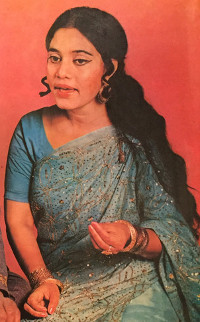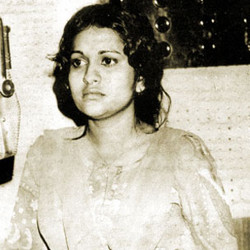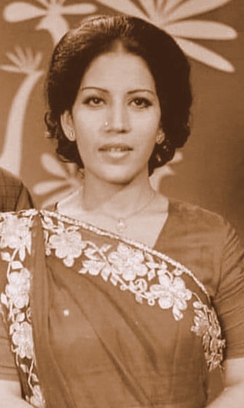
Ustad Ghulam Ali is a Pakistani ghazal singer of the Patiala Gharana. Ghulam Ali is considered as one of the greatest ghazal singers of his era. He has also been a prominent playback singer in Bollywood. He is a disciple of Bade Ghulam Ali Khan. Ali was also trained by Bade Ghulam Ali's younger brothers – Barkat Ali Khan and Mubarak Ali Khan.

Naseem Begum, known professionally as Mala, was a Pakistani playback singer of Urdu and Punjabi films.

Amjad Islam Amjad, PP, Sitara-e-Imtiaz was a Pakistani Urdu poet, screenwriter, playwright and lyricist.
Irene Perveen also spelled as Irene Parveen is a Pakistani playback singer from the 1960s, who mainly sang for Pakistani films. She gained popularity for her film song, "Tumhi ho mehboob mere" for movie Aaina (1966).
Chandrani Mukherjee is a former Bollywood playback singer, she is a sister-in-law of Bappi Lahiri from West Bengal and a Filmfare nominee.
Chandrani began her career in Bollywood with the film Aag Aur Toofan in 1975. Thereafter she sang in a couple of films until her swan song in Aaj Kie Aurat (1993). She was nominated for the Filmfare Best Female Playback Award thrice though she never won it.

A-Plus TV is a Pakistani entertainment TV channel. Its chairman is Abdul Jabbar. It is a major entertainment channel in Pakistan.
Sonia Khan is a Pakistani film and television actress. She has worked in Urdu, Punjabi, Sindhi and Pashto films.
Kaleem Usmani was a Pakistani Urdu poet who wrote ghazals, naats, patriotic songs and more than one hundred songs for thirty-seven Urdu films.
Shabab Kairanwi was a Pakistani film director, producer, and occasional screenwriter, lyricist and a novelist. He debuted in the Pakistani film industry as a producer and lyricist with Jalwa (1955) while he made his directorial debut with Surayya (1961).

Nighat Seema was a Pakistani radio and film singer during the era of 60s and 70s. She is known for singing semi-classical songs, ghazals, and playback singing. She was the mother of music composer Ahsan Ali Taj.

Munawar Sultana was a Pakistani radio and film singer. She is known for vocalizing first ever hit Lollywood songs like, "Mainu Rab Di Soun Tere Naal Piyar Ho Gya", "Wastae Rab Da Tu Jaanvi We Kabootra" ,and "Ae Qaid-e-Azam, Tera Ehsan Hay, Ehsan".

Rubina Badar was a Pakistani radio, TV, and film singer. She is known for her TV song, "Tum Sung Nainan Laagay".

Kauser Parveen was a Pakistani playback singer during the 1950s and 1960s. She is known for vocalizing popular songs like, "O Maina Na Jane Kya Hogaya Kahan Dil Khogaya", "Pal Pal Jhoomun Jhoom Ke Gaun", and the film lullaby, "Raaj Dularey, Meri Ankhiyon Ke Taray".
Fariya Hassan is a Pakistani actress and model. She is known for her roles in dramas Muqaddas, Shanakht, Maikay Ki Yaad Na Aaye, Ahsas, Tere Bina and Raqs-e-Bismil.
Naheed Niazi is a former Pakistani playback singer who performed in the Lollywood movies during the era of 1960s. She was married to musician Muslehuddin; her sister is the singer Najma Niazi. She is known for her playback songs, "Chali Re Chali Re Main To Des Piya Ke Chali Re", "Raat Saloni Ayi", and others.

Bilqees Khanum was a Pakistani classical music singer. She is known for singing ghazals and geets like "Kuch Din To Baso Meri Ankhon Mein", "Anokha Laadla Khelan Ko Mangay Chand", and "Mat Samjho Hum Ne Bhula Diya".
Gulshan Ara Syed is a Pakistani ghazal singer known for vocalizing the Urdu ghazal Tumharay Shehar Ka Mausam Bara Suhana Lagay.








